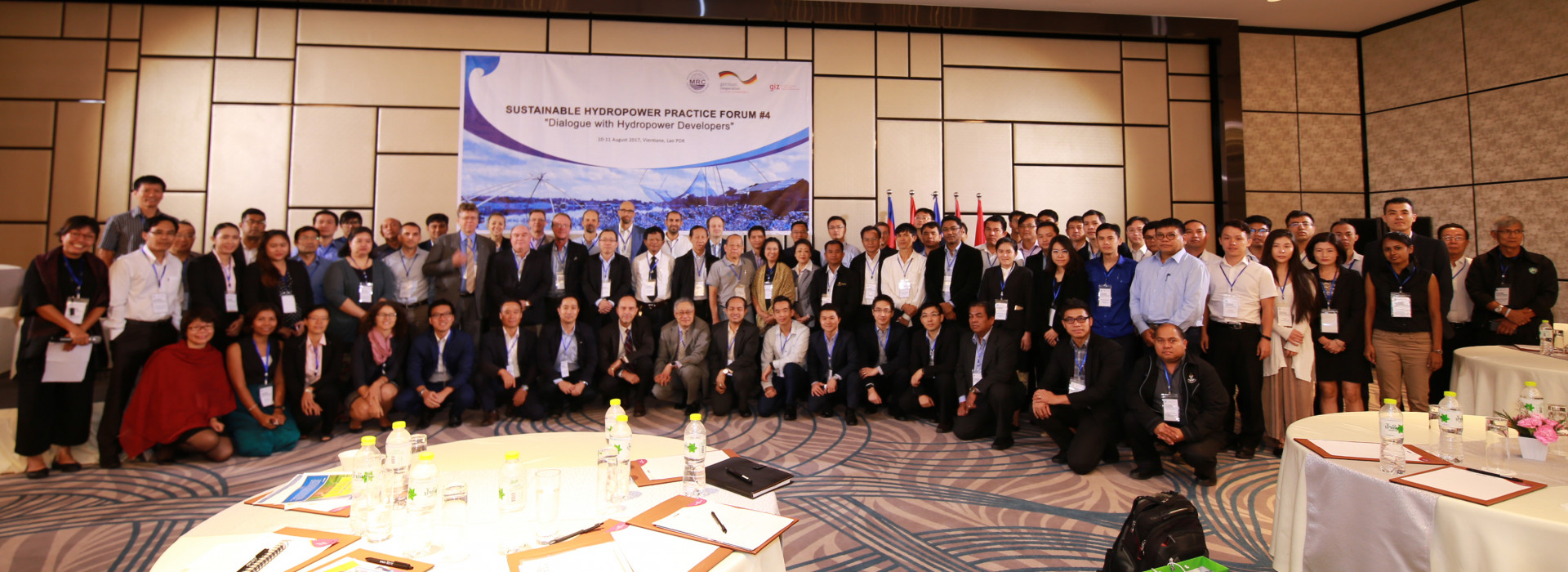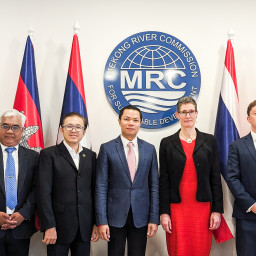Press Release: MRC’s Regional Hydropower Forum Focus on Sustainable Hydropower Development
Vientiane Capital, Lao PDR – Today, stakeholders of hydropower-interest groups gathered in Vientiane Capital, Lao PDR for the Mekong River Commission’s Fourth Sustainable Hydropower Practice Forum themed ‘Dialogue with Hydropower Developers’.
The forum provided an opportunity for hydropower developers and specialists, government, research institutes, development partners and other regional and international organizations to discuss about hydropower planning and development in the Mekong Basin.
Hydropower is an important development opportunity in the Mekong River Basin. Over the past decade, rapid hydropower developments in the mainstream and tributaries have transformed the Mekong region into one of the most active in the world for hydropower development. Concerns about the cumulative and transboundary impacts of existing and proposed hydropower schemes on the environment, fisheries, and people’s livelihoods have been brought to the forefront by Mekong River Commission (MRC) and a wide range of stakeholders.

Since 2008, improving the sustainability of the basin’s hydropower developments has been a strategic priority in the MRC’s Mekong Basin Development Strategy, jointly prepared by member countries (Cambodia, Lao PDR, Thailand, and Viet Nam) setting out how they will use, manage, and conserve the water and related resources of the Mekong in line with the 1995 Mekong Agreement.
The MRC have conducted many studies, tools, and guidelines that draw on international experiences while also developing technical expertise in the region. These tools and guidelines are now ready to be applied.
“Today at the forum, we emphasize the importance of MRC guidelines that were developed to assist member countries and developers in the planning, design and operation of hydropower projects in the most optimal and sustainable way, guided by the unique Mekong cooperation spirit” said MRC CEO Dr Pham Tuan Phan.
The forum also discussed the role of developers in improving the sustainability of their projects for optimal outcome in the Mekong basin.
Private sector developers play a key role in facilitating, financing and implementing hydropower development in the basin. Therefore, MRC seeks to engage with hydropower developers (as one of the key stakeholders) to ensure development properly consider cross sectoral benefits and impacts, reduce transboundary impacts, and enhance water, food and energy security.
The forum is partly funded by Deutsche Gesellschaft für Internationale Zusammenarbeit (GIZ). Since 2015, MRC, supported by GIZ, has organized a number of fora to engage a broad range of stakeholders in sustainable hydropower development in the Mekong Basin. The MRC is currently updating its Sustainable Hydropower Development Strategy aimed at designing optimal and sustainable hydropower development pathways: enhancing benefits beyond national borders and minimizing adverse transboundary impacts while supporting water, food, and energy security.
Note to Editor:
The Mekong River Commissionis the intergovernmental organization established to promote cooperation on the sustainable management of the Mekong basin whose members include Cambodia, Lao PDR, Thailand and Viet Nam. The MRC acts as a platform for water diplomacy and regional cooperation in which member countries share the benefits of common water resources despite different national interests, and address transboundary pressures in the basin. It also serves as a knowledge hub that promotes regional cooperation and policy-making based on scientific evidence. The MRC is not a supra-national or regulatory body. The commission looks across all sectors including sustaining fisheries, identifying opportunities for agriculture, maintaining the freedom of navigation, flood management and preserving important ecosystems. Superimposed on these are the future effects of more extreme floods, prolonged drought and sea level rise associated with climate change.
-END-





